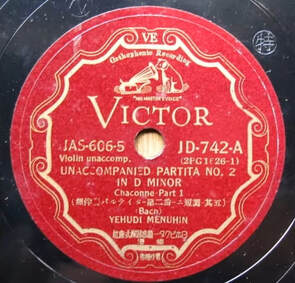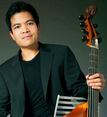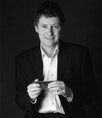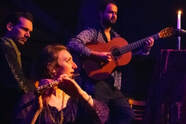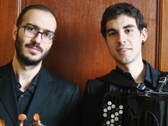Music on Thursdays - Online
Thursday 22nd April 2021
Yehudi Menuhin 105
Available: from Thursday 22nd April
Guest host: Lynda Chang
Guest host: Lynda Chang
♫ ───────────────────────────────────
Programme
Yehudi Menuhin 105
celebrating the birth of
Yehudi Menuhin (1916-1999)
in New York City, 22nd April 1916
Edward William Elgar (1857-1934)
‡from Violin Concerto in B minor Op 61 (1901-1910)
1 Allegro
Johann Sebastian Bach (1685-1750)
from Partita in D minor for solo Violin BWV 1004 (1717-20)
V Ciaconna
Johannes Brahms (1833-1897)
‡from Violin Concerto in D Op 77 (1878)
2 Adagio (in F major)
Antonio Lucio Vivaldi (1678-1741)
‡from Le Quattro Stagioni - The Four Seasons (1716-17)
Concerto No 2 in G minor, Op 8, RV 315, L'estate Summer
iii Presto (in G minor)
Ludwig van Beethoven (1770-1827)
from Violin Concerto in D major Op 61 (1806)
II Larghetto (in G major)
Concert duration: 48 minutes
‡ full length recordings of these concertos are also linked below
‡from Violin Concerto in B minor Op 61 (1901-1910)
1 Allegro
Johann Sebastian Bach (1685-1750)
from Partita in D minor for solo Violin BWV 1004 (1717-20)
V Ciaconna
Johannes Brahms (1833-1897)
‡from Violin Concerto in D Op 77 (1878)
2 Adagio (in F major)
Antonio Lucio Vivaldi (1678-1741)
‡from Le Quattro Stagioni - The Four Seasons (1716-17)
Concerto No 2 in G minor, Op 8, RV 315, L'estate Summer
iii Presto (in G minor)
Ludwig van Beethoven (1770-1827)
from Violin Concerto in D major Op 61 (1806)
II Larghetto (in G major)
Concert duration: 48 minutes
‡ full length recordings of these concertos are also linked below
♫ ───────────────────────────────────
|
We need your help to fund our concerts recorded 'as live' by professional musicians |
♫ ───────────────────────────────────
Yehudi Menuhin 105
Greetings.
We could hardly let the day pass without pointing out that this is the 105th anniversary of Yehudi Menuhin's birth on 22 April 1916 (d 12 March 1999). This violinist, conductor and philanthropist was born in the US, became a citizen of Switzerland in 1970 and of the UK in 1985.
Menuhin was hailed as a genius pretty much throughout his life. He started playing the violin at the age of 5 and was performing in public by the age of 7. His first professional engagement took place at the age of 8 in San Francisco. His New York debut occurred at the age of 10, and by the time he was 13, he had appeared in London, Berlin and Paris.
In the summer of 1932, Menuhin (aged 16) was scheduled to record the Elgar (1857-1934) violin concerto conducted by the 75 year-old composer himself. He recounts the story that two days before the recording, he went rather nervously to meet Elgar and offered to play it to him to see if there might be any problems. Apparently, even before he had got to the second subject (ie only a short way in), Elgar stopped him and said "It will be wonderful - I'm not worried at all. It's a beautiful day and I'm off to the races!" And indeed, it WAS a wonderful performance. Right from his youth, Menuhin's playing was distinguished with expansive lyricism, utter conviction and maturity far beyond his years.
Here is the first part of that recording of the first movement - what was available to fit on one side of the vinyl of the time. There is an orchestral introduction of some two and a half minutes before the violin entry.
We could hardly let the day pass without pointing out that this is the 105th anniversary of Yehudi Menuhin's birth on 22 April 1916 (d 12 March 1999). This violinist, conductor and philanthropist was born in the US, became a citizen of Switzerland in 1970 and of the UK in 1985.
Menuhin was hailed as a genius pretty much throughout his life. He started playing the violin at the age of 5 and was performing in public by the age of 7. His first professional engagement took place at the age of 8 in San Francisco. His New York debut occurred at the age of 10, and by the time he was 13, he had appeared in London, Berlin and Paris.
In the summer of 1932, Menuhin (aged 16) was scheduled to record the Elgar (1857-1934) violin concerto conducted by the 75 year-old composer himself. He recounts the story that two days before the recording, he went rather nervously to meet Elgar and offered to play it to him to see if there might be any problems. Apparently, even before he had got to the second subject (ie only a short way in), Elgar stopped him and said "It will be wonderful - I'm not worried at all. It's a beautiful day and I'm off to the races!" And indeed, it WAS a wonderful performance. Right from his youth, Menuhin's playing was distinguished with expansive lyricism, utter conviction and maturity far beyond his years.
Here is the first part of that recording of the first movement - what was available to fit on one side of the vinyl of the time. There is an orchestral introduction of some two and a half minutes before the violin entry.
|
Edward William Elgar (1857-1934) from Violin Concerto in B minor Op 61 (1901-1910) 1 Allegro performed by Yehudi Menuhin, with the London Symphony Orchestra, conducted by Sir Edward Elgar recorded at EMI's Abbey Road Studios, Summer 1932 |
For those who would prefer to hear the full concerto, lasting some 50 minutes, here is the link to this complete historic recording. This is still rated as one of the two greatest recordings of Elgar's concerto:
Edward William Elgar (1857-1934)
Violin Concerto in B minor Op 61 (1901-1910) 1 Allegro 2 Andante 3 Allegro molto, and cadenza Yehudi Menuhin, with the London Symphony Orchestra, conducted by Sir Edward Elgar |
♫ ───────────────────────────────────
The following is a 1934 (Paris, re-mastered) recording of the young 18 year-old Menuhin playing Bach's great D minor Chaconne - music that would become indelibly associated with him for the rest of his life. It is full of heart and raw energy, and with a blazing insight that again belies his youth.
♫ ───────────────────────────────────
With this kind of international stardom before he had even reached 20 years of age, any lesser mortal might have crumbled, but not Menuhin. Perhaps his generation was made of sterner stuff than those who came after. He simply went on and on for the rest of his life, determined to gift his music as often and as widely as he could.
Next comes a recording of the Brahms violin concerto that was broadcast live in April 1943 - Adagio (slow) movement here only. He made this with the BBC Symphony Orchestra, conducted by Sir Adrian Boult. The performance was broadcast during the height of WWII and elicited the most emotional and fervent playing from the 27 year-old. Surely no one can fail to be moved by the intensity he brings to this sublime music. Please note here that the orchestral introduction also lasts for over 2 minutes before the violin makes its appearance:
Next comes a recording of the Brahms violin concerto that was broadcast live in April 1943 - Adagio (slow) movement here only. He made this with the BBC Symphony Orchestra, conducted by Sir Adrian Boult. The performance was broadcast during the height of WWII and elicited the most emotional and fervent playing from the 27 year-old. Surely no one can fail to be moved by the intensity he brings to this sublime music. Please note here that the orchestral introduction also lasts for over 2 minutes before the violin makes its appearance:
|
|
Johannes Brahms (1833-1897) from Violin Concerto in D Op 77 (1878) 2 Adagio (in F major) performed by Yehudi Menuhin with the BBC Symphony Orchestra, conducted by Sir Adrian Boult in a live transmission on the BBC Home Service, from the BBC's Maida Vale Studios, on 5th April 1943 |
And again, for those who prefer to listen to the same live recording of the full concerto, when he was praised for being "in his most glorious form, eloquent and expansive":
|
|
Johannes Brahms (1833-1897)
Violin Concerto in D Op 77 (1878) 1 Allegro non troppo 2 Adagio (in F major) 3 Allegro giocoso, ma no troppo vivace - Poco più presto Johann Sebastian Bach from Partita No 3 in E for Solo Violin BWV 1006.1 (1720) 1 Preludio Yehudi Menuhin with the BBC Symphony Orchestra, conducted by Sir Adrian Boult, 5th April 1943 |
♫ ───────────────────────────────────
During the war, Menuhin played over 500 concerts for the Allied troops. In 1945, aged 29, he set off for Germany with Benjamin Britten taking with them and performing the vast solo violin repertoire. They played to the liberated prisoners in Belsen twice in one afternoon and the experience moved him deeply. He himself said "I shall never forget that afternoon as long as I live." In the post-war years, some members of that Belsen audience would come to see him backstage after his international concerts. One can only imagine the emotions that would have surfaced on those occasions.
Menuhin's career developed not only as a virtuoso violinist but also as a conductor and a much revered teacher. He was renowned for his generosity of spirit and his humanitarian works. In 1957, he founded the International Music Academy in Gstaad, Switzerland where his annual Menuhin Music Festival continues to thrive and inspire.
In the UK, he set up the Yehudi Menuhin School (1962) in Stoke d'Abernon, where his stated intention was to create rounded people who also happened to be exceptional musicians. We are lucky to have the school on our doorstep and many from our audience are committed supporters, deriving great pleasure from the public students' concerts that take place throughout the year.
The roll call of those who have studied with Menuhin is extensive and the clearest evidence of his lasting gift to music. I would like to highlight just two of these alumni. At first sight, they may seem to be chalk and cheese, but a closer look may reveal that Menuhin had indeed achieved his goal of nurturing not just musical talent but also a sense of curiosity and engagement with the world at large.
Nigel ('Nige') Kennedy came from a musical family and, being a child prodigy, joined the Menuhin School from the age of seven. He is most often remembered as an enfant terrible of the classical world - deliberately adopting a cockney accent, appearing on stage in jeans and trainers, and generally cocking a snoop at the tradition that had produced him in the first place.
His Vivaldi Four Seasons recording in 1989 sold millions of copies and launched him as a 'pop' icon. He retired from public view for a few years after which he reappeared with new interests in Hendrix, rock, jazz and klezmer (a jewish-gypsy genre). He is certainly a musician who is admired by some for not being afraid to go his own way. He continues to acknowledge his debt to Menuhin, and is due to appear in July this year at the Gstaad Festival 'as a friend of the family' in a programme provocatively called "When I'm 64".
Here is a performance he made of Summer, the 3rd movement of Vivaldi's Four Seasons, in 2005 with the Polish Chamber Orchestra. Unconventional is undoubtedly an under-statement but there is no denying the excitement and sense of communication that he generates with the orchestra and the audience who are on their feet cheering him at the end.
Menuhin's career developed not only as a virtuoso violinist but also as a conductor and a much revered teacher. He was renowned for his generosity of spirit and his humanitarian works. In 1957, he founded the International Music Academy in Gstaad, Switzerland where his annual Menuhin Music Festival continues to thrive and inspire.
In the UK, he set up the Yehudi Menuhin School (1962) in Stoke d'Abernon, where his stated intention was to create rounded people who also happened to be exceptional musicians. We are lucky to have the school on our doorstep and many from our audience are committed supporters, deriving great pleasure from the public students' concerts that take place throughout the year.
The roll call of those who have studied with Menuhin is extensive and the clearest evidence of his lasting gift to music. I would like to highlight just two of these alumni. At first sight, they may seem to be chalk and cheese, but a closer look may reveal that Menuhin had indeed achieved his goal of nurturing not just musical talent but also a sense of curiosity and engagement with the world at large.
Nigel ('Nige') Kennedy came from a musical family and, being a child prodigy, joined the Menuhin School from the age of seven. He is most often remembered as an enfant terrible of the classical world - deliberately adopting a cockney accent, appearing on stage in jeans and trainers, and generally cocking a snoop at the tradition that had produced him in the first place.
His Vivaldi Four Seasons recording in 1989 sold millions of copies and launched him as a 'pop' icon. He retired from public view for a few years after which he reappeared with new interests in Hendrix, rock, jazz and klezmer (a jewish-gypsy genre). He is certainly a musician who is admired by some for not being afraid to go his own way. He continues to acknowledge his debt to Menuhin, and is due to appear in July this year at the Gstaad Festival 'as a friend of the family' in a programme provocatively called "When I'm 64".
Here is a performance he made of Summer, the 3rd movement of Vivaldi's Four Seasons, in 2005 with the Polish Chamber Orchestra. Unconventional is undoubtedly an under-statement but there is no denying the excitement and sense of communication that he generates with the orchestra and the audience who are on their feet cheering him at the end.
|
Antonio Lucio Vivaldi (1678-1741)
from Le Quattro Stagioni - The Four Seasons (1716-17) Concerto No 2 in G minor, Op 8, RV 315, L'estate Summer iii Presto (in G minor) performed by Nigel Kennedy, violin, directing, with the Polish Chamber Orchestra at La Citadelle, Carcassonne, France |
If you would like to come back and listen to the complete performance of Vivaldi's The Four Seasons, from that summer evening in Carcassone, here is the video:
|
♫ ───────────────────────────────────
From the other end of the spectrum comes Nicola Benedetti, best known for winning top prize of the BBC Young Musicians' Competition at the age of 16. As a beloved household name in the UK, she is increasingly using her fame as a platform for speaking out and championing musical education for the young. Her lockdown online violin teaching programmes show her reaching out to aspiring violinists the world over.
Here is a live recording of Benedetti playing the slow movement of the Beethoven violin concerto at the Royal Festival Hall with the Philharmonia Orchestra in November 2020. It is a concerto closely associated with Menuhin himself and is played here with an intense lyricism.
Here is a live recording of Benedetti playing the slow movement of the Beethoven violin concerto at the Royal Festival Hall with the Philharmonia Orchestra in November 2020. It is a concerto closely associated with Menuhin himself and is played here with an intense lyricism.
|
|
Ludwig van Beethoven (1770-1827) from Violin Concerto in D major Op 61 (1806) II Larghetto (in G major) performed by Nicola Benedetti, with the Philharmonia Orchestra recorded 'as live' in the Royal Festival Hall, London |
♫ ───────────────────────────────────
I must leave the final word to the master himself. This is a short clip that shows Menuhin performing and speaking with his great friend, Ravi Shankar. The joy that he derived from this friendship in music shines through, alongside his characteristic humility and humanitarianism.
Ravi Shankar, sitar
Yehudi Menuhin, violin
from F Productions' Pandit Ravi Shankar, Documentary: A portrait of the maestro of the sitar for medici.tv, 1986
Yehudi Menuhin was knighted in 1956, appointed Order of Merit (OM) in 1987, and created a life peer in 1993.
He died on 12 March 1999, aged 82 in Germany. According to his wishes, he was buried in the grounds of the Menuhin School in Stoke d'Abernon.
He died on 12 March 1999, aged 82 in Germany. According to his wishes, he was buried in the grounds of the Menuhin School in Stoke d'Abernon.
♫ ───────────────────────────────────
We hope you have enjoyed Lynda Chang's
Yehudi Menuhin 105th Anniversary Selection for Music on Thursdays
Watch your email and this website
for news of next Thursday's Sexual Intrigue Selection, all about the opera world
We continue with weekly video selection concerts until the end of June, with hopes of going live at Leatherhead Methodist Church from July 1st.
The first Thursdays in May and June will be
special 'as live' recordings for
Music on Thursdays
6th May: Buck Brass Trio ♦ 3rd June: Iñigo Mikeleiz Berrade, accordion
comments welcome: [email protected]
Yehudi Menuhin 105th Anniversary Selection for Music on Thursdays
Watch your email and this website
for news of next Thursday's Sexual Intrigue Selection, all about the opera world
We continue with weekly video selection concerts until the end of June, with hopes of going live at Leatherhead Methodist Church from July 1st.
The first Thursdays in May and June will be
special 'as live' recordings for
Music on Thursdays
6th May: Buck Brass Trio ♦ 3rd June: Iñigo Mikeleiz Berrade, accordion
comments welcome: [email protected]
|
▼ last week's selection ▼
|
▼ next week's selection ▼ (not yet active)
|
♫ ───────────────────────────────────
We need your help to fund our concerts recorded 'as live' by professional musicians
|
► Did you listen ?
►Did you remember to give afterwards ? Here is a further chance to do so If the concerts cover their costs we will be able to do more. Please donate now ! Many thanks to those who have donated already. You set us all a great example ! |
♫ ───────────────────────────────────
Apr 1st
|
Feb 25th
|
Oct 15th
|
Oct 8th
|
Oct 1st
|
♫ ───────────────────────────────────────
♫ ───────────────────────────────────────
♫ ───────────────────────────────────────
♫ ───────────────────────────────────────








